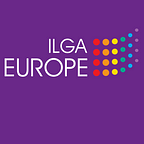#UkraineLGBTI Update: LGBTI shelters need urgent support, medication continues to be a major issue and more
Here’s our latest update on what’s happening for LGBTI people either staying in or fleeing Ukraine, the ways we’re working to help, and how you can urgently help too.
Shelters for LGBTI people in Ukraine running out of necessities
Since the start of the war, many shelters that have been established by local activists in different parts of Ukraine for LGBTI people who have chosen to stay for personal reasons or are unable to leave. Two months after the Russian invasion began, people are becoming overstretched as those running these shelters have to find ways to pay rent, have money to buy food, basic necessities and medication. At ILGA-Europe, we are channelling financial support to as many organisations as we can, and coordinating with the many other LGBTI organisations and partners who are directly supporting groups in the country. But more is urgently needed. To find out how you can directly support Ukrainian organisations giving support to LGBTI people in the country, click here.
Medication continues to be a major issue for LGBTI people
Trans and intersex people in Ukraine continue to experience difficulties accessing the medications they urgently need, as are people living with HIV. At ILGA-Europe we are working closely with other partner organisations to help move desperately needed medications across borders. The fact that LGBTI organisations have to organise medical shipment is highlighting a very big gap in current humanitarian work. That’s why we’re also advocating with UN agencies and other humanitarian actors for them to ensure provision of specific medications which LGBTI people need. Here is our current briefing document on the medication needs of trans and intersex people.
Trans people continue to experience extreme difficulties
Particular attention continues to be paid to the situation of trans people who are in Ukraine. ILGA-Europe is working with TGEU and many others to find ways for trans women to be exempted from military services and be granted the necessary documents to be able to leave the country when they wish to. While we collectively succeeded in bringing the issue to the attention of institutions, international organisations and governments, concerns for the safety of trans people in Ukraine remain, and this continues to be a key advocacy priority. To read our blog on how the war is affecting trans people, click here.
There’s a gap in knowledge about what’s happening for LGBTI people in occupied areas
As the war goes on, we know that the issues faced by people only grow and sadly become more serious. One growing concern shared by ILGA-Europe and our colleagues in other LGBTI organisations is the fact that there are gaps in our knowledge about what is happening in Russian occupied areas of Ukraine. This is something we’re turning our attention to.
Humanitarian actors need to be LGBTI inclusive
The war in Ukraine is reminding us of the significant work to be done to make sure that humanitarian aid becomes LGBTI inclusive. From access to medication and safe shelters in conflict zones to support for LGBTI refugees, there’s a need for the humanitarian sector to take into consideration specific vulnerabilities of LGBTI people. This work cannot rest only on LGBTI activists and communities as is the case at the moment. That’s why building bridges with humanitarian organisations and identifying ways to effectively work with them is a new focus for the ILGA-Europe team. To find out some easy ways for humanitarian agencies not to leave LGBTI people click here. Please share this document on your social media!
More LGBTI organisations in host countries are becoming engaged
As we saw during the COVID-19 crisis, more and more LGBTI organisations, many of them members of ILGA-Europe, have put other work aside to become involved in humanitarian aid for LGBTI refugees crossing their borders, setting themselves up as first points of contact. This shows the incredible resourcefulness and creativity of LGBTI activists and organisations, but the reason why they’re stepping up is because there are huge gaps in governmental support. We are compiling an ongoing list of these organisations, which can be found here. Please share this list on your social media.
Limits of the EU Directive are being identified
Under the Temporary Protection Directive, on 4 March 2022, the European Council unanimously adopted a decision to give those fleeing war in Ukraine the right to temporary protection in EU countries. As organisations reach out to help LGBTI people who have fled Ukraine, some limitations of the EU Temporary Protection Directive are being identified, such as:
- People with non-Ukrainian passports are experiencing difficulties at some borders.
- Bi-national LGBTI couples are being separated because only one of them carries a Ukrainian passport.
- There are delays in access to urgent medication for trans people in some countries where medical bureaucracy for trans people is difficult to navigate.
- In some countries, where housing already a national issue, the accommodation of refugees from Ukraine is a rising issue.
Learn more by reading our briefing note on temporary protection and LGBTI people in EU member states.
Requests for psycho-social support are rapidly increasing
At ILGA-Europe we are receiving support requests from Ukrainian activists and activists who have been supporting refugees, who are finding themselves burnt out and their mental health suffering, two months into this war. We are currently looking into ways in which we can deliver this support.
To learn more about how ILGA-Europe are responding to the war in Ukraine, read more about our Information, Action, Direction plan here.
